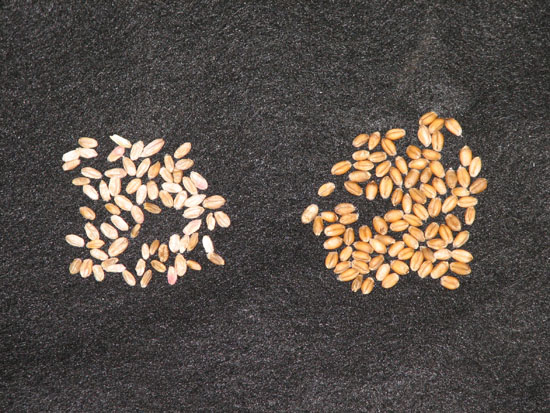Summary: Powdery mildew is a major
limitation for the production of bread wheat. Lately, researchers found that
MED25 may play a conserved role in regulating bread wheat and barley
susceptibility to powdery mildew and they identified the TaMED25-TaEIL1-TaERF1
signaling module as a negative regulator of bread wheat resistance to powdery
mildew.
*New
on the official website of the Institute of Crop Sciences of Chinese Academy of
Agricultural Sciences.

Source: Bing
Powdery mildew, caused by the biotrophic
fungal pathogen Blumeria graminis f. sp. tritici (Bgt), is a major limitation
for the production of bread wheat (Triticum aestivum L.). However, to date, the
transcriptional regulation of bread wheat defense against powdery mildew
remains largely unknown.
Thus, researchers Liu Jie, Zhang Tianren,
Jia Jizeng and Sun Jiaqiang reported the function and molecular mechanism of
the bread wheat Mediator subunit 25 (TaMED25) in regulating bread wheat immune
response signaling pathway. Three homoeoalleles of TaMED25 from bread wheat
were identified and mapped to chromosomes 5A, 5B, and 5D, respectively. They
showed that knockdown of TaMED25 by Barley Stripe Mosaic Virus (BSMV)-induced
gene silencing (VIGS) reduced bread wheat susceptibility to the powdery mildew
fungus during the compatible plant-pathogen interaction.
Moreover, their results indicated that
MED25 may play a conserved role in regulating bread wheat and barley
susceptibility to powdery mildew. Similarly, the bread wheat ETHYLENE
INSENSITIVE3-LIKE1 (TaEIL1), an ortholog of Arabidopsis ETHYLENE INSENSITIVE3
(EIN3), negatively regulates bread wheat resistance against powdery mildew.

Using various approaches, they demonstrated
that the conserved activator-interacting domain (ACID) of TaMED25 physically
interacts with the separate N- and C-terminal regions of TaEIL1, contributing
to the transcriptional activation activity of TaEIL1. Further, they showed that
TaMED25 and TaEIL1 synergistically activate ETHYLENE RESPONSE FACTOR1 (TaERF1)
transcription to modulate bread wheat basal disease resistance to Bgt through
repressing the expression of pathogenesis related (PRs) genes and deterring the
accumulation of reactive oxygen species (ROS).
Collectively, they identified the TaMED25-TaEIL1-TaERF1
signaling module as a negative regulator of bread wheat resistance to powdery
mildew.
About CCM:
CCM is the leading market intelligence
provider for China’s agriculture, chemicals, food & ingredients and life
science markets. Founded in 2001, CCM offers a range of data and content
solutions, from price and trade data to industry newsletters and customized
market research reports. Our clients include Monsanto, DuPont, Shell, Bayer,
and Syngenta. CCM is a brand of Kcomber Inc.
For more information about CCM, please
visit www.cnchemicals.com or get in
touch with us directly by emailing econtact@cnchemicals.com or calling +86-20-37616606.